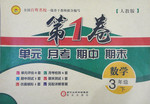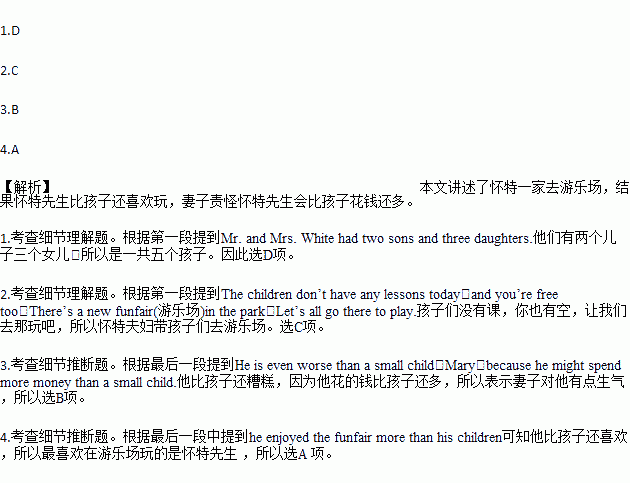题目内容
Mr. and Mrs.White had two sons and three daughters.One Sunday,Mrs. White said to her husband,“The children don’t have any lessons today,and you’re free too.There’s a new funfair(游乐场)in the park.Let’s all go there to play. ”
Her husband said,“1 want to finish some work today. ” “Oh, forget it.Go there and make our children happy.That’s the most important work.” Mrs. White said.
So Mr. and Mrs. White took their children to the funfair.Mr. White was forty-five years old, but he enjoyed the funfair more than his children. He hurried from one thing to another,and ate lots of sweets. One of the children said to her mother,“Dad is just like a small child,isn’t he, Mom?” Mrs. White didn’t want to follow her husband around any more at that time and answered,“He is even worse than a small child,Mary,because he might spend more money than a small child.”
1.There were ________ children in the White family.
A. two B. three
C. four D. five
2.One Sunday,Mr.and Mrs. White wanted to go to _______ with their children.
A. school B. work
C. a funfair D. a shop.
3.From the story we know Mrs.White________ when Mary asked her the question.
A. was still excited to play B. was a little angry with Mr. White
C. looked for Mr.White everywhere D. ate a lot of sweets
4.Of all he family members,_________ enjoyed playing there most that Sunday.
A. Mr.White B. Mrs.White
C. Mary D. the boys
 第1卷单元月考期中期末系列答案
第1卷单元月考期中期末系列答案

 ely children. As they drove into their hometown feeling glad to be back,they noticed ______,and they went off their usual route to see what it was. They found a ______ in flames. Mary said,“Oh,well,it isn’t our fire,let’s go home.”
ely children. As they drove into their hometown feeling glad to be back,they noticed ______,and they went off their usual route to see what it was. They found a ______ in flames. Mary said,“Oh,well,it isn’t our fire,let’s go home.” a lot from him. The teacher had a free talk to us with easy English . He spoke slow so that we could understand
a lot from him. The teacher had a free talk to us with easy English . He spoke slow so that we could understand him well. Sometimes he repeated what we don’t understand. My classmates were all active in the class. To his joy, I understood everything the teacher said. And I was able to ask question in English. This class encouraged me very much. I’m sure that until we keep on practising, it will be easy for us to learn speaking English well.
him well. Sometimes he repeated what we don’t understand. My classmates were all active in the class. To his joy, I understood everything the teacher said. And I was able to ask question in English. This class encouraged me very much. I’m sure that until we keep on practising, it will be easy for us to learn speaking English well.